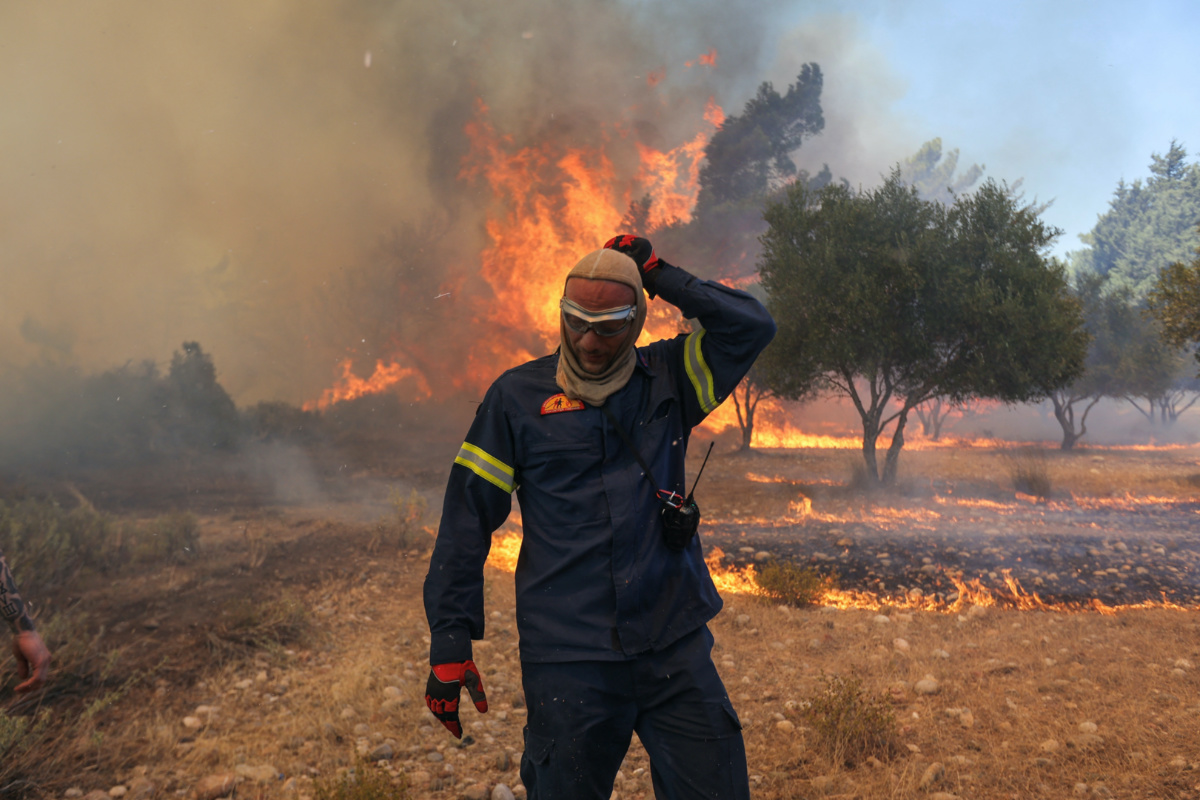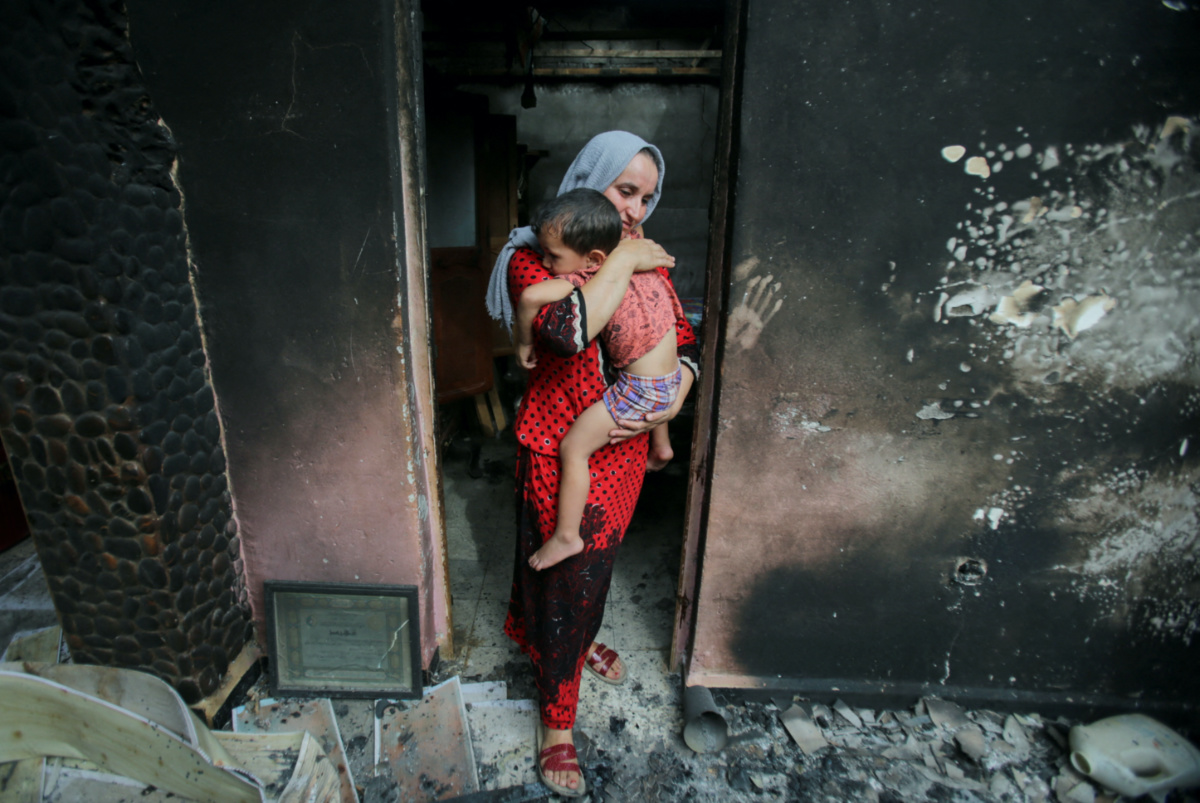Rhodes, Greece/Algiers, Algeria
Reuters
A plane fighting wildfires in Greece crashed killing two airmen on Tuesday, as large areas of the Mediterranean sweltered under an intense summer heatwave and Algeria battled to control an inferno in which at least 34 people have died.
The plane, which had been dropping water, came down on a hillside close to the town of Karystos on the Greek island of Evia, east of Athens. The captain and co-pilot, aged 34 and 27, both died, the air force said.

A firefighter walks next to rising flames as a wildfire burns near the village of Vati, on the island of Rhodes, Greece, on 25th July, 2023. PICTURE: Reuters/Nicolas Economou
Greece has been particularly hard hit by fires, with authorities evacuating more than 20,000 people in recent days from homes and resorts in the south of the holiday island of Rhodes.
Close to 3,000 holidaymakers had returned home by plane as of Tuesday, according to figures from the Transport Ministry, and tour operators have cancelled upcoming trips.
CLIMATE CHANGE ROLE IN JULY HEATWAVES ‘OVERWHELMING’, SCIENTISTS SAY
Human-induced climate change has played an “absolutely overwhelming” role in the extreme heatwaves that have swept across North America, Europe and China this month, according to an assessment by scientists published on Tuesday.
Throughout July, extreme weather has caused havoc across the planet, with temperatures breaking records in China, the United States and southern Europe, sparking forest fires, water shortages and a rise in heat-related hospital admissions.
Over the weekend, thousands of tourists were evacuated from the Greek island of Rhodes to escape wildfires caused by a record-breaking heatwave.
Without human-induced climate change, the events this month would have been “extremely rare”, according to a study by World Weather Attribution, a global team of scientists that examines the role played by climate change in extreme weather.
“European and North American temperatures would have been virtually impossible without the effects of climate change,” said Izidine Pinto of the Royal Netherlands Meteorological Institute, one of the study’s authors, during a briefing with journalists. “In China it was around 50 times more likely to happen compared to the past.”
The World Weather Attribution team estimated that rising greenhouse gas concentrations made the European heatwave 2.5 Celsius hotter than it would otherwise have been. They also drove up the North American heatwave by two degrees and the one in China by one degree.
As well as directly impacting human health, the heat has caused large-scale crop damage and livestock losses, the scientists said, with US corn and soybean crops, Mexican cattle, southern European olives as well as Chinese cotton all severely affected.
El Nino probably contributed to the additional heat in some regions, but rising greenhouse gases were the major factor, the scientists said, and heatwaves will become increasingly likely if emissions are not slashed.
They estimated that prolonged periods of extreme heat were likely to hit every two to five years if average global temperatures rise two degrees above pre-industrial levels. Average temperatures are currently estimated to have risen more than 1.1 degrees.
“The events we have looked at are not rare in today’s climate,” said Friederike Otto, a scientist with the Grantham Institute for Climate Change in London, speaking at the briefing. “It’s not surprising from a climatological point of view, that these events are happening at the same time.”
“As long as we keep burning fossil fuels we will see more and more of these extremes,” she said. “I don’t think there’s any stronger evidence that any science has ever presented for a scientific question.”
– DAVID STANWAY, Singapore/Reuters
Italy suffered a twin pounding from the elements when severe storms battered the north, killing a woman and a 16-year-old girl scout, while southern regions sweltered. In the south, a 98-year-old man, who was bedridden, died when fire swept through his home.
Extreme weather throughout July has caused havoc across the planet, with record temperatures in China, the United States and southern Europe sparking forest fires, water shortages and a rise in heat-related hospital admissions.
The heat, with temperatures topping 40 Celsius, is well in excess of what usually attracts tourists who flock to southern European beaches.
The high temperatures and parched ground sparked wildfires in countries on both sides of the Mediterranean.
Several dozen firefighters were using aircraft to battle a wildfire that had broken out close to Nice international airport in southern France.
In north Africa, Algeria was fighting to contain devastating forest fires along its Mediterranean coast in a blaze which has already killed at least 34 people. Fanned by strong winds, fires also forced the closure of two border crossings with neighbouring Tunisia.
Wildfires also broke out in the countryside around Syria’s Mediterranean port city, Latakia, with the authorities using army helicopters to try to put them out.
Saving the hotel
Greek Prime Minister Kyriakos Mitsotakis said his country was one of those on the front line against climate change, with no easy solution.
“I will state the obvious: in the face of what the entire planet is facing, especially the Mediterranean which is a climate change hot-spot, there is no magical defence mechanism, if there was we would have implemented it,” Mitsotakis said.
The fires will deal a blow to a tourist industry that is a mainstay of the Greek economy. It accounts for 18% of gross domestic product and one in five jobs, with an even greater contribution on islands such as Rhodes.
Lefteris Laoudikos, whose family owns a small hotel in the Rhodes seaside resort town of Kiotari, one of the epicentres of a fire over the weekend, said its 200 guests – mainly from Germany, Britain and Poland – evacuated in rental cars.
He said his father, cousin and two others were trying to douse the flames using a nearby water tank.
“My father saved the hotel. I called him, and he didn’t want to leave. He told me ‘if I leave there will be no hotel’.”

Souhila Belkati carries her child inside her burnt house following a wildfire in Bejaia, Algeria, on 25th July, 2023. PICTURE: Reuters/Ramzi Boudina
“Silent killer”
Scientists have described extreme heat as a “silent killer” taking a heavy toll on the poor, the elderly and those with existing medical conditions.
Research published this month said as many as 61,000 people may have died in Europe’s sweltering heatwaves last summer, suggesting preparedness efforts are falling fatally short.
The heat has also caused large-scale crop damage and livestock losses, the World Weather Attribution scientists said, with US corn and soybean crops, Mexican cattle, southern European olives as well as Chinese cotton all severely affected.
Residents of Milan were surveying the mess after the dramatic overnight storm and winds of over 100 kilometres per hour.
“It all happened around 4 or 5am this morning, it was very short but very intense, it knocked down several trees…with the wind gusts they took off and broke up,” witness Roberto Solfrizzo, 66, told Reuters.
– With reporting by ANGELIKI KOUTANTOU, RENEE MALTEZOU, FEDERICO MACCIONI, ALVISE ARMELLINI, JANA CHOUKEIR, TAREK AMERA, NAYERA ABDALLA, AUGUSTIN TURPIN AND DAVID STANWAY






